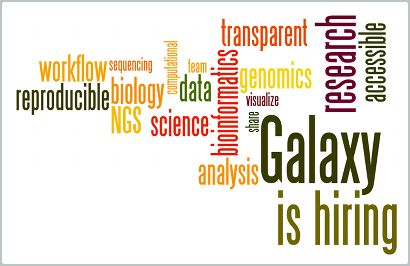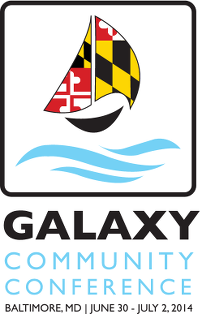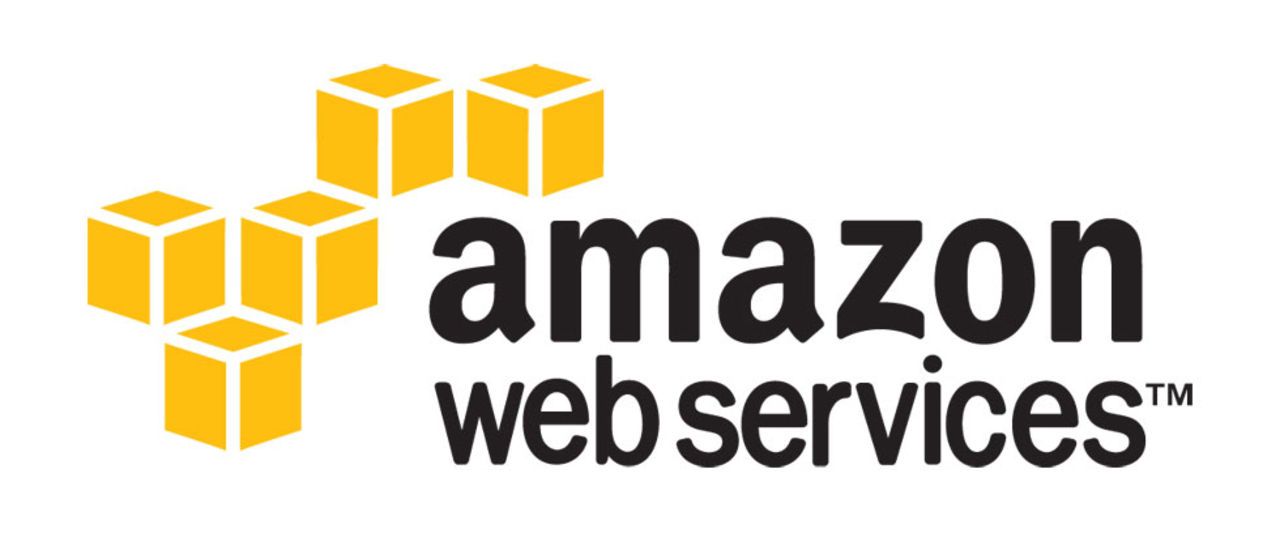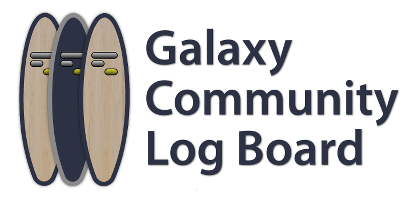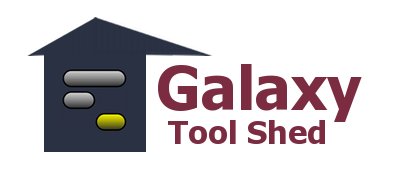March 2014 Galaxy Update
Welcome to the March 2014 Galaxy Update, a monthly summary of what is going on in the Galaxy community. Galaxy Updates complement the Galaxy Development News Briefs which accompany new Galaxy releases and focus on Galaxy code updates.
New Papers
54 papers were added to the Galaxy CiteULike Group in Febrary. Some papers that may be particularly interesting to the Galaxy community:
-
Dissemination of scientific software with Galaxy ToolShed, by Blankenberg, Von Kuster, Bouvier, Baker, Afgan, Stoler, the Galaxy Team, Taylor and Nekrutenko, Genome Biology, Vol. 15, No. 2. (20 February 2014), 403, doi:10.1186/gb4161
-
Binding Sites Analyser (BiSA): Software for Genomic Binding Sites Archiving and Overlap Analysis, by Khushi, et al., PLoS ONE, Vol. 9, No. 2. (12 February 2014), e87301, doi:10.1371/journal.pone.0087301
-
Oqtans: a multifunctional workbench for RNA-seq data analysis, by Sreedharan, et al., BMC Bioinformatics, Vol. 15, No. Suppl 3. (2014), A7, doi:10.1186/1471-2105-15-s3-a7
How those papers were tagged:
| # | Tag | # | Tag | # | Tag | # | Tag | |||
|---|---|---|---|---|---|---|---|---|---|---|
| 3 | Cloud | 1 | Project | 6 | Tools | 3 | UsePublic | |||
| - | HowTo | = | RefPublic | - | UseCloud | - | Visualization | |||
| 4 | IsGalaxy | 3 | Reproducibility | 3 | UseLocal | 14 | Workbench | |||
| 26 | Methods | 2 | Shared | 6 | UseMain |
GigaScience Galaxy Series
The GigaScience “Galaxy: Data Intensive and Reproducible Research” series announced for the 2013 Galaxy Community Conference has just published its first papers, and is continuing to take submissions. Whilst the series considers best practice papers, discussion, as well as novel uses of Galaxy, these first papers are examples of Galaxy toolkits, with a genome diversity tool collection presented from the Miller lab at Pennsylvania State, and a set of analytical and visualisation tools for Complete Genomics sequencing data from the Stubbs lab at Erasmus Medical College. The genome diversity toolkit is their first example that integrates with their GigaGalaxy server, with SVG graphs to help visualize how input datasets, workflows and histories are related to each example analysis in the paper. BGI is continuing to cover the article processing charges until the end of this year, so for more information see their blog posting.
Who’s Hiring
The Galaxy is expanding! Please help it grow.
-
Stage M2 Recherche : Provenance dans un système de workflows pour la bioinformatique
-
Stage M1/M2, Development and integration of computational methods into the Galaxy analysis framework, Institut Curie, Paris
-
Statistical Genomics Postdoc opening in the Makova lab at Penn State
-
The Galaxy Project is hiring software engineers and post-docs, including positions at George Washington University.
-
Postdoctoral position in genomics/bio-informatics (NGS) at University of Rennes 1 (France)
Got a Galaxy-related opening? Send it to outreach@galaxyproject.org and we’ll put it in the Galaxy News feed and include it in next month’s update.
Events
Galaxy Australasia Workshop 2014: 24-25 March
The 1st Galaxy Australasia Workshop 2014 (GAW 2014) will be held in Melbourne, Australia on 24 and 25th March 2014.
The Galaxy Australasia Workshop is a great opportunity for you to participate in two full days of presentations, discussions, poster sessions, keynotes and lightning talks, all about ways of using Galaxy for high-throughput biology, imaging and other scientific applications. The workshop will also include Training Sessions taught by Galaxy developers and master users. GAW 2014 will run 24 and 25th March, immediately preceding Computational and Simulation Sciences and eResearch in Melbourne. GAW 2014 will also include poster session, keynote speakers.
Registration is open. Registration is also free, but space is limited.
The first day (Monday) will be in Clayton, next to the Australian Synchrotron. For the 2nd day (Tuesday) we will move downtown the Melbourne Convention Centre, the venue for the Computational and Simulation Sciences and eResearch.
Globus World 2014
GlobusWorld is this year’s biggest gathering of all things Globus. GlobusWorld features a Biosciences/Genomics Program devoted to research data in genomics and biosciences including Globus Genomics, a Globus and Galaxy based platform for genomic analysis. GlobusWorld is being held April 15-17, in Chicago.
Learn how to get more out of your data, and connect with other HPC administrators, research scientists, and developers who are building and using cutting-edge solutions to wrangle data.
Galaxy will have a presence at this meeting, and GCC2014 is a Silver Sponsor of GlobusWorld.
GCC2014: June 30 - July 2, Baltimore
The 2014 Galaxy Community Conference (GCC2014) will be held June 30 through July 2, at the Homewood Campus of Johns Hopkins University, in Baltimore, Maryland, United States.
Registration is Open
Early registration is now open. Early registration saves more than 70% on registration costs, and Training Day registration is an additional 55% off if you register for both at the same time. This is by far the most affordable option, with early registration fees starting at less than $50 per day. When you register you can also reserve lodging at Charles Commons, a very affordable housing option in the same building as the conference.
Training Day is an opportunity to learn about all things Galaxy including using Galaxy, deploying and managing Galaxy, extending Galaxy, and Galaxy internals. There are 5 parallel tracks, each with 3 sessions, with each of those sessions two and half hours long. That’s 15 sessions and over 37 hours of workshop material.
Abstract Submission is Open
Abstract submission for both oral presentations and posters is also open. Abstract submission for oral presentations closes April 4, while poster submission closes April 25. Poster authors will be notified of acceptance status within two weeks of submission, while presentation authors will be notified no later than May 2. Please consider presenting your work. If you are dealing with big biological data, then this meeting wants to hear about it.
Accepted talks and selected posters from GCC2014 are also eligible for consideration to appear in the GigaScience “Galaxy: Data Intensive and Reproducible Research” series described above.
Sponsorships
We are pleased to have Amazon Web Services (AWS) as the sponsor for the GCC Training Day for the third year in a row. Also please welcome BioMaryland as a Bronze Sponsor for GCC2014. BioMaryland is new to the GCC.
There are still Silver and Bronze sponsorships available. Please contact the Organizers if your organization would like to help sponsor this event.
Exhibitors
In 2014 we are also adding non-sponsor exhibit spaces in addition to the sponsor exhibits. This will significantly increase the size of the exhibit floor. Please contact the Organizers if your organization would like to have an exhibit space at GCC2014.
Other Events
There are several other [events of interest](/events/) in the next few months. Also see the [Galaxy Events Google Calendar](http://bit.ly/gxycal) for details on other events of interest to the community.New Public Servers
One new public Galaxy server, PGTB was added, and the NELLY server is back.
Galaxy PGTB (Virtual Biodiversity Lab)
- Links:
- Domain/Purpose: This is a standard Galaxy instance implemented with specific tools for Biodiversity (Biodiversity Virtual Lab) and NGS (Ion Torrent from the PGTB facility) analysis.
- Comments: Due to current disk space limitations, registration is required. Account request on demand at [Email](mailto:contact DOT pgtp AT pierroton DOT inra DOT fr).
- User Support: [Email](mailto:contact DOT pgtp AT pierroton DOT inra DOT fr)
- Quotas: Registered users: 50GB;
- Sponsor(s): INRA and Equipex Xyloforest and Labex CEBA and Plateforme Genome Transcriptome de Bordeaux
Galaxy Distributions
The most recent version of CloudMan was released in January 2014.
Feb 10, 2014 Galaxy Distribution
**Complete [News Brief](http://wiki.galaxyproject.org/DevNewsBriefs/2014-02-10)****Highlights:**
- Visualization upgrades, including Trackster CSS styling
- Multiple Tools migrated to the Tool Shed for a leaner distribution
- Redesign of UI rendering: new icons, new font, history pane updates
- API functionality upgrades featuring a new master admin API key and
- Tool Shed updates a focus on repository metadata, displays, installs, and tests
- Over 35 new community contributions added
http://bitbucket.org/galaxy/galaxy-dist
http://galaxy-dist.readthedocs.org
new: $ hg clone https://bitbucket.org/galaxy/galaxy-dist#stable
upgrade: $ hg pull
$ hg update release_2014.02.10Galaxy Community Hubs
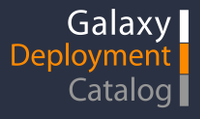
| Share your experience now |
The Community Log Board and Deployment Catalog Galaxy community hubs were launched in December. If you have a deployment, or experience you want to share then please publish them.
ToolShed Contributions
New Repositories in the Galaxy Project ToolShed
- phylorelatives: Relatedness of minor alelle sequences in NJ tree
- advanced_grep_from_file: Extended Grep Using Perl, fetch lines after match and get patterns from file
- getalleleseq: Generate FASTA sequence from alleles table
- hetbox: minor variant boxplot
- find_in_reference: filter tab file where a field is a substring of a field in any line of a reference
- filter_bed_on_splice_junctions: Filter out lines w/ junctions in reference bed file of known junctions
- translate_bed_sequences: 3 frame translation of BED file augmented with a sequence column
- rsem: RNA SEQ by Expectation Maximization
- snpeff_to_peptides: Creates a peptide fasta from a SnpEff VCF output and an Ensembl all_peps.fa
- synteny_mapper: find microrearrangements w/in syntenic regions, viz & compare UCSC features
- bamtools_wrappers: Wrappers for the bamtools package
- fastq_qc_trimmer: Parallel FASTQ QC Trimmer
- fastq_all_to_sanger: Very Fast groomer of quality formats to Sanger
- prada: pipeline for RNAseq data analysis for Illumina paired end data
- shrnaseq: shRNAseq differential representation analysis using edgeR
- segemehl: short read mapping with gaps
- blockbuster: Detection of blocks of overlapping reads
- twistdna: prediction of superhelically destabilized regions
- rnaz: predicting structural noncoding RNAs
Other News
- GOBLET is collecting Bioinformatics Training needs across the globe



